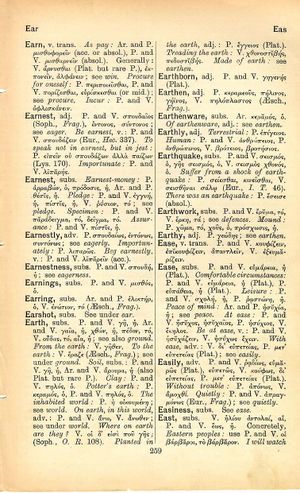earthly: Difference between revisions
From LSJ
οἱ Κυρηναϊκοὶ δόξαις ἐχρῶντο τοιαύταις: δύο πάθη ὑφίσταντο, πόνον καὶ ἡδονήν, τὴν μὲν λείαν κίνησιν, τὴν ἡδονήν, τὸν δὲ πόνον τραχεῖαν κίνησιν → the Cyrenaics admitted two sensations, pain and pleasure, the one consisting in a smooth motion, pleasure, the other a rough motion, pain
(Woodhouse 2) |
(CSV4) |
||
| Line 1: | Line 1: | ||
{{ | {{Woodhouse1 | ||
| | |Text=[[File:woodhouse_259.jpg|thumb|link={{filepath:woodhouse_259.jpg}}]]'''adj.''' | ||
<b class="b2">Terrestrial</b>: P. [[ἐπίγειος]]. | |||
<b class="b2">Human</b>: P. and V. [[ἀνθρώπειος]], P. [[ἀνθρώπινος]], V. [[βρότειος]], [[βροτήσιος]]. | |||
}} | }} | ||
Revision as of 09:36, 21 July 2017
English > Greek (Woodhouse)
adj.
Terrestrial: P. ἐπίγειος. Human: P. and V. ἀνθρώπειος, P. ἀνθρώπινος, V. βρότειος, βροτήσιος.

